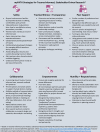Trauma-informed patient and public-engaged research: Development and evaluation of an online training programme
- PMID: 36345789
- PMCID: PMC9854293
- DOI: 10.1111/hex.13668
Trauma-informed patient and public-engaged research: Development and evaluation of an online training programme
Abstract
Introduction: As patients, members of the public, and professional stakeholders engage in co-producing health-related research, an important issue to consider is trauma. Trauma is very common and associated with a wide range of physical and behavioural health conditions. Thus, it may benefit research partnerships to consider its impact on their stakeholders as well as its relevance to the health condition under study. The aims of this article are to describe the development and evaluation of a training programme that applied principles of trauma-informed care (TIC) to patient- and public-engaged research.
Methods: A research partnership focused on addressing trauma in primary care patients ('myPATH') explicitly incorporated TIC into its formation, governance document and collaborative processes, and developed and evaluated a free 3-credit continuing education online training. The training was presented by 11 partners (5 professionals, 6 patients) and included academic content and lived experiences.
Results: Training participants (N = 46) positively rated achievement of learning objectives and speakers' performance (ranging from 4.39 to 4.74 on a 5-point scale). The most salient themes from open-ended comments were that training was informative (n = 12) and that lived experiences shared by patient partners were impactful (n = 10). Suggestions were primarily technical or logistical.
Conclusion: This preliminary evaluation indicates that it is possible to incorporate TIC principles into a research partnership's collaborative processes and training about these topics is well-received. Learning about trauma and TIC may benefit research partnerships that involve patients and public stakeholders studying a wide range of health conditions, potentially improving how stakeholders engage in co-producing research as well as producing research that addresses how trauma relates to their health condition under study.
Patient or public contribution: The myPATH Partnership includes 22 individuals with professional and lived experiences related to trauma (https://www.usf.edu/cbcs/mhlp/centers/mypath/); nine partners were engaged due to personal experiences with trauma; other partners are community-based providers and researchers. All partners contributed ideas that led to trauma-informed research strategies and training. Eleven partners (5 professionals, 6 patients) presented the training, and 12 partners (8 professionals, 4 patients) contributed to this article and chose to be named as authors.
Keywords: co-production; participatory research; patient and public involvement and engagement; stakeholder-driven research; training; trauma; trauma-informed care.
© 2022 The Authors. Health Expectations published by John Wiley & Sons Ltd.
Conflict of interest statement
The authors declare no conflict of interest.
Figures
References
Publication types
Grants and funding
LinkOut - more resources
Full Text Sources
Research Materials


